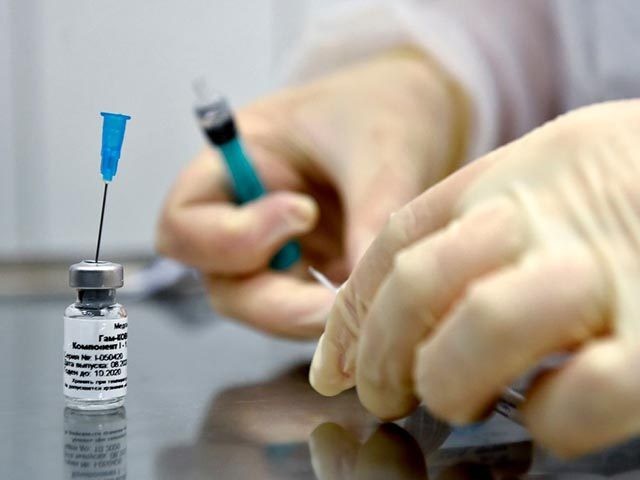The government of Ukraine issued a decree this week banning the distribution of Sputnik V, a Russian coronavirus vaccine candidate President Vladimir Putin hastily approved last year, Reuters reported Wednesday, after warning the product was a “hybrid weapon” against the country.
The administration of President Volodymyr Zelensky has escalated its measures to diminish the influence of Russian propaganda operations in the country, most recently shutting down a media network owned by a close ally of Putin’s, given the greater context of a protracted invasion and war by Russian separatists in the nation’s east. Russia also invaded and annexed the Crimea region of Ukraine in 2014; it remains under Russian control today.
Zelensky arrived in the eastern Donetsk region of the country on Thursday, on a visit to assess the on-the-ground condition in the war there. Separatist groups in the greater Donbass region, where a war has been ongoing since 2014, claim to have established sovereign “republics” in the Ukrainian territory. Kyiv regularly accuses the separatists of cooperating with Russia, though Russia keeps a distance publicly from those fighting the Ukrainian military on the ground.
The official Ukrainian government decree published this week formally prohibited the nation’s public health and drug regulatory authorities from approving any vaccine created “in a state recognized by the Ukrainian parliament as a state aggressor,” a list that only includes Russia, as it is the only country currently involved in hostilities with Ukraine.
Ukraine is a member of the Covax program, run by the World Health Organization (W.H.O.), which is designed to help poorer nations access coronavirus vaccine doses. Sputnik V is not yet part of the Covax portfolio — the Russian government has claimed that it prefers to sign vaccine deals with nations directly rather than through the W.H.O. intermediary, but has left room for a potential deal to offer doses of Sputnik V through the program.
“We will be working with COVAX, but definitely we will not be substituting COVAX for the approach we’ve been using till now to basically supply vaccines to countries directly,” Russian Direct Investment Fund CEO Kirill Dmitriev said in January.
Ukraine is an active participant in Covax, which allows for the potential of a shipment of Sputnik V in the future if the government did not explicitly prevent its importing.
Banning the Chinese coronavirus product this week followed incendiary remarks by the Ukrainian foreign ministry accusing Russia of using the vaccine as a “weapon” to promote its geopolitical interests.
“There’s another hybrid dimension in this story, the situation with the Russian vaccine. We understand that when it comes to the Russian vaccine, it’s a hybrid weapon of Russia against Ukraine,” Foreign Minister Dmytro Kulebo said in a televised interview in December. The remark indicates that Ukrainian officials are more concerned about Russia’s political interests regarding the vaccine than its efficacy, which has raised eyebrows around the world.
President Vladimir Putin approved Sputik V in August 2020, making it the first coronavirus candidate approved for distribution by a state power in history. The Russian government did not indicate that public health officials deemed it safe and effective — Putin overrode his own Health Ministry — and admitted at the time that the product had not completed Phase III clinical trials. Putin assured Russians it was a safe product by claiming his daughter had received a dose, but never clarified which of his two daughters had done so.
Given the lack of testing, international health experts warned that many questions about its ability to combat the virus safely remained unanswered. Russia nonetheless began selling the vaccine candidate to allied countries. A study in the Lancet medical journal published last week — five months after Putin approved the vaccine — concluded that its Phase III trials indeed proved that it had some effect in fighting the virus.
Russia-backed fighters in the Donbass region began distributing Sputnik V, claiming approval by their alleged “sovereign” government, in early February.
“The leader of the so-called Donetsk republic Denis Pushilin said a first batch of ‘several thousand’ Sputnik V doses had arrived and that doctors and soldiers would be inoculated first starting from Monday,” the Moscow Times reported on February 1. Leonid Pasechnik, the self-proclaimed leader of separatist Luhansk, similarly announced a shipment from Russia of the product. Neither the Donetsk nor Luhansk separatists are known to have public health experts fighting in their war and they did not give any indication that they independently studied the effectiveness of the vaccine candidate.
The separatists’ announcements escalated pressure on the Zelensky government to begin distributing vaccines. At press time, Ukraine has yet to begin vaccinating citizens. Under Covax, it is expecting nearly 2 million doses of “Coronavac,” a Chinese coronavirus candidate created by the Chinese company Sinovac. “Coronavac” is believed to be the least effective of the coronavirus vaccine candidates currently in widespread circulations; studies have shown it is only about 50 percent effective in combating infections.
Ukrainian Health Minister officials also announced major purchases of some of the most successful vaccines currently available, including the American Pfizer/BioNTech vaccine, believed to be about 95 percent effective. Kyiv has also contracted to purchase as many as 3.7 million doses of the European vaccine created by AstraZeneca and the University of Oxford.
Sinovac applied for formal approval of its vaccine this week.

COMMENTS
Please let us know if you're having issues with commenting.